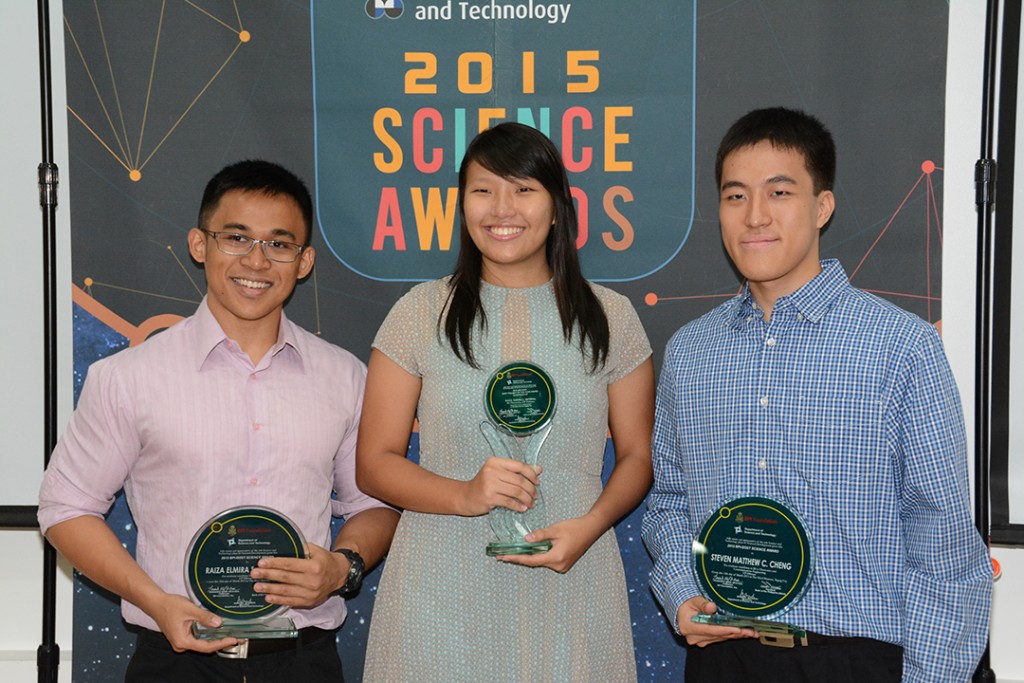
By Albino C. Gamba Jr., photo by Leonardo Reyes
(MAY 4)— Raiza Elmira S. Imperial (BS Chemistry), Steven Matthew C. Cheng (BS Electronics and Communications Engineering) and Xavier M. Puspus (BS Applied Physics) are this year’s recipients of the Bank of the Philippine Islands (BPI)- Department of Science and Technology (DOST) Science Awards.
The students, all seniors, were chosen for their exceptional performance in the field of science. The awarding ceremony was held on April 20 at the Institute of Environmental Science and Meteorology Auditorium.
Imperial’s thesis entitled “One-Step Fabrication of Superhydrophobic/Superolephellic Ellectrodeposited Polythiophene for Oil and Water Separation,” seeks to find a simpler way of fabricating a coating that is “water-hating but oil-loving” which can be used for oil spills.
Imperial, a cum laude candidate, proposed a methodology that requires one step and a single component as compared to the present oil spill remedial technique which needs two or more steps and multiple components.
“The current oil spill remedial techniques are very tedious and time consuming and may only be used for a certain type of oil and/or a certain type of water (fresh water or salt water) whereas the coating we fabricated can separate any type of oil from both salt water and fresh water,” Imperial said.
Imperial’s study also won the top awards of this year’s National Chemistry Student’s Congress, and the Philippine Chemistry Congress.
Meanwhile, Cheng thesis entitled “Design and Implementation of UHF Bi-Directional Amplifier for WiFi Over TV White Space” looked into utilizing the abundant unused TV channels, the TV white space (TVWS), as a resource to provide communication channels during emergencies and disasters. Generally, it aimed to implement a “UHF BDA that will operate within the UHF TV band (450 MHz-900MHz).”
The study is expected to establish a link between cellular towers/service providers in rural areas, hence, giving mobile signal connection to people within these areas.
“After calamities where the primary networks go down, this could effectively give temporary and immediate cellular coverage for better communication between the disaster risk management office in the unaffected areas and the corresponding authorities in the disaster affected area. Relief and rescue operations would then become faster, more efficient, and easier,” Cheng said.
Cheng, who completed his academic requirements in four-and-a-half years, is now an instructor at the College of Engineering’s Institute of Electrical and Electronics Engineering. He has a cum laude standing.
Completing the triumvirate is Puspus thesis “Quantum Entanglement in a Low-Temperature Superconducting State,” a theoretical study on building super/much faster computers for large-scale optimization, data decryption, and materials simulation.
The BPI-DOST Science Awards are given yearly to three exceptional students for higher levels of excellence in specialized fields of science, namely: mathematics, physics, chemistry, engineering, computer science and biology. These students come from the awards’ 10 partner universities namely: Ateneo de Davao University, Ateneo de Manila University, De La Salle University, Saint Louis University, Siliman University, University of San Carlos, University of Santo Tomas, University of the Philippines – Diliman, University of the Philippines – Los Baños and Xavier University.
